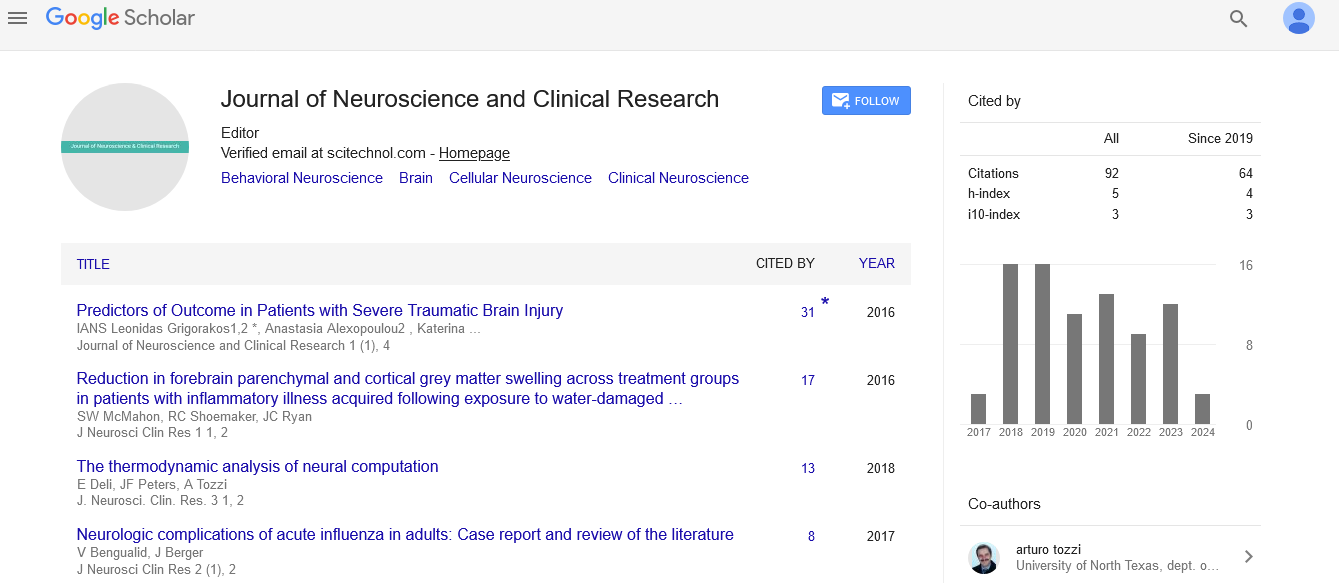Opinion Article, J Neurosci Clin Res Vol: 8 Issue: 1
The Complexities of Brain-Body Interactions: Implications for Neurological and Psychiatric Disorders
Lisa Kitema*
Department of Neuroscience, Imperial College London, South Kensington, UK
*Corresponding Author: Lisa Kitema
Department of Neuroscience, Imperial
College London, South Kensington, UK
E-mail: lisa@st-kit.ac.uk
Received date: 01 March, 2023, Manuscript No. JNSCR-23-92891;
Editor assigned date: 03 March, 2023, Pre QC No. JNSCR-23-92891(PQ);
Reviewed date: 17 March, 2023, QC No. JNSCR-23-92891;
Revised date: 24 March, 2023, Manuscript No. JNSCR-23-92891(R);
Published date: 31 March, 2023, DOI: 10.4172/Jnscr.1000144
Citation: Kitema L (2023) Molecular Mechanisms of Neurological Disorders: Insights from Basic and Clinical Research. J Forensic Toxicol Pharmacol 12:1.
Description
The brain and the body are interconnected in complex ways, and their interactions are important to our ability to function as healthy individuals. The brain controls many of the body's functions, including movement, sensation, and the regulation of internal organs, while the body sends feedback to the brain about its state, such as hunger, pain, or fatigue. This bidirectional communication is essential for maintaining homeostasis, or the body's balance of physiological processes.
There are many ways in which the brain and body interact, and these interactions can be influenced by a variety of factors, such as genetics, environment, and lifestyle. For example, stress can impact the brain and body in multiple ways, triggering the release of stress hormones like cortisol, which can affect everything from blood pressure to digestion. Similarly, chronic inflammation in the body can have a negative impact on the brain, leading to cognitive decline and other health problems.
Other factors that can impact brain-body interactions include diet, exercise, sleep, and social connection. For instance, regular exercise has been shown to improve brain function, reduce stress, and promote overall health, while a diet high in sugar and processed foods can have negative effects on both the brain and body. Lack of sleep can also impact brain function, leading to impaired cognitive abilities, while social isolation has been linked to increased risk of depression, anxiety, and other mental health problems.
Understanding the complexities of brain-body interactions is essential for promoting optimal health and preventing disease. By taking steps to support the health of both our brain and body, such as eating a healthy diet, exercising regularly, getting enough sleep, and staying connected to others, we can optimize our overall health and well-being.
Neurological and psychiatric disorders are among the most debilitating and challenging conditions facing individuals today. These disorders can affect anyone, regardless of age, gender, or ethnicity. They can also have a significant impact on a person's life, including their ability to function, interact with others, and maintain their overall well-being.
The implications of neurological and psychiatric disorders are vast and varied. From the individual level to society as a whole, these conditions have a profound impact on our lives.
At the individual level, neurological and psychiatric disorders can lead to significant impairments in cognitive, emotional, and behavioral functioning. Individuals with these disorders may experience difficulty with memory, attention, decision-making, and problem-solving. They may also have mood disturbances, such as depression or anxiety, and struggle with regulating their emotions. Behavioral problems, such as impulsivity or aggression, can also occur in some cases. These impairments can have a significant impact on an individual's ability to perform daily tasks, engage in meaningful activities, and maintain social relationships.
At the family level, neurological and psychiatric disorders can produce a significant burden for caregivers and loved ones. Family members may need to provide ongoing support and care, which can be physically, emotionally, and financially challenging. They may also experience feelings of stress, anxiety, and depression as a result of the demands placed on them by the condition.
At the community level, neurological and psychiatric disorders can have a significant impact on healthcare resources and social services. These disorders often require ongoing treatment and support, which can be expensive and place a strain on healthcare systems. In addition, individuals with these disorders may require specialized education, vocational training, and support services, which can place a burden on community resources.
At the societal level, neurological and psychiatric disorders can have a significant impact on the economy, with significant costs related to lost productivity and healthcare expenses. These disorders can also contribute to social stigma and discrimination, which can provide additional barriers to accessing care and participating fully in society.
Despite these challenges, there is hope for individuals living with neurological and psychiatric disorders. Advances in neuroscience and mental health research have led to the development of new treatments and interventions that can help individuals manage their symptoms and improve their quality of life. In addition, efforts to reduce stigma and increase awareness of these conditions are helping to break down barriers and improve access to care.
The implications of neurological and psychiatric disorders are far reaching and complex. These conditions can have a profound impact on individuals, families, communities, and society as a whole. However, with ongoing research, treatment, and support, individuals with these disorders can achieve greater levels of functioning and improve their quality of life. It is up to all of us to work together to address the challenges posed by neurological and psychiatric disorders and help those affected by these conditions live healthy, fulfilling lives.
 Spanish
Spanish  Chinese
Chinese  Russian
Russian  German
German  French
French  Japanese
Japanese  Portuguese
Portuguese  Hindi
Hindi 